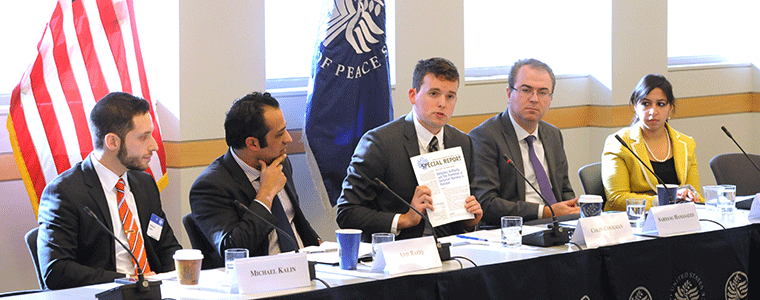Sectarian Conflict in Pakistan: Local and Regional Dimensions
The U.S. Institute of Peace hosted a discussion analyzing factors that have contributed to sectarian tension in Pakistan and the surrounding region.

Sectarian divisions are growing in Pakistan. Contemporary public opinion surveys suggest these religious communal identities are hardening and violent militant organizations – drawn primarily but not exclusively from the Sunni Deobandi tradition – are increasingly targeting rival religious minorities, killing thousands across the country in attacks over the past decade.
Although membership and motivations have varied local and historical roots, many of Pakistan’s sectarian actors, both violent militant groups and organizations operating within the political system, rationalize their activities in the context of larger regional tensions between branches of Sunni and Shia Islam. Pakistan’s sectarian cleavages do not appear to be on the verge of equaling those currently taking place in Iraq, Syria and other parts of the Islamic world. But they do represent compounding challenge to an already highly-strained Pakistani state, whose leadership has struggled to effectively address the sectarian militant threat.
On November 19, the U.S. Institute of Peace hosted a panel discussion analyzing factors that have contributed to sectarian tension in Pakistan, placing these conflicts in both local context and in the regional context of trends in the greater Middle East and Islamic world. Speakers included the authors of two recent USIP research publications, “Religious Authority and the Promotion of Sectarian Tolerance in Pakistan,” and “Pakistan’s Resurgent Sectarian War.” Continue the conversation on Twitter with #PakistanSectarianism.
Speakers
Michael Kalin
PhD candidate, Yale University
Niloufer Siddiqi
PhD candidate, Yale University
Arif Rafiq
President, Vizier Consulting, LLC; adjunct scholar, Middle East Institute
Sarhang Hamasaeed
Senior Program Officer, U.S. Institute of Peace
Colin Cookman, Moderator
Senior Program Specialist, U.S. Institute of Peace



